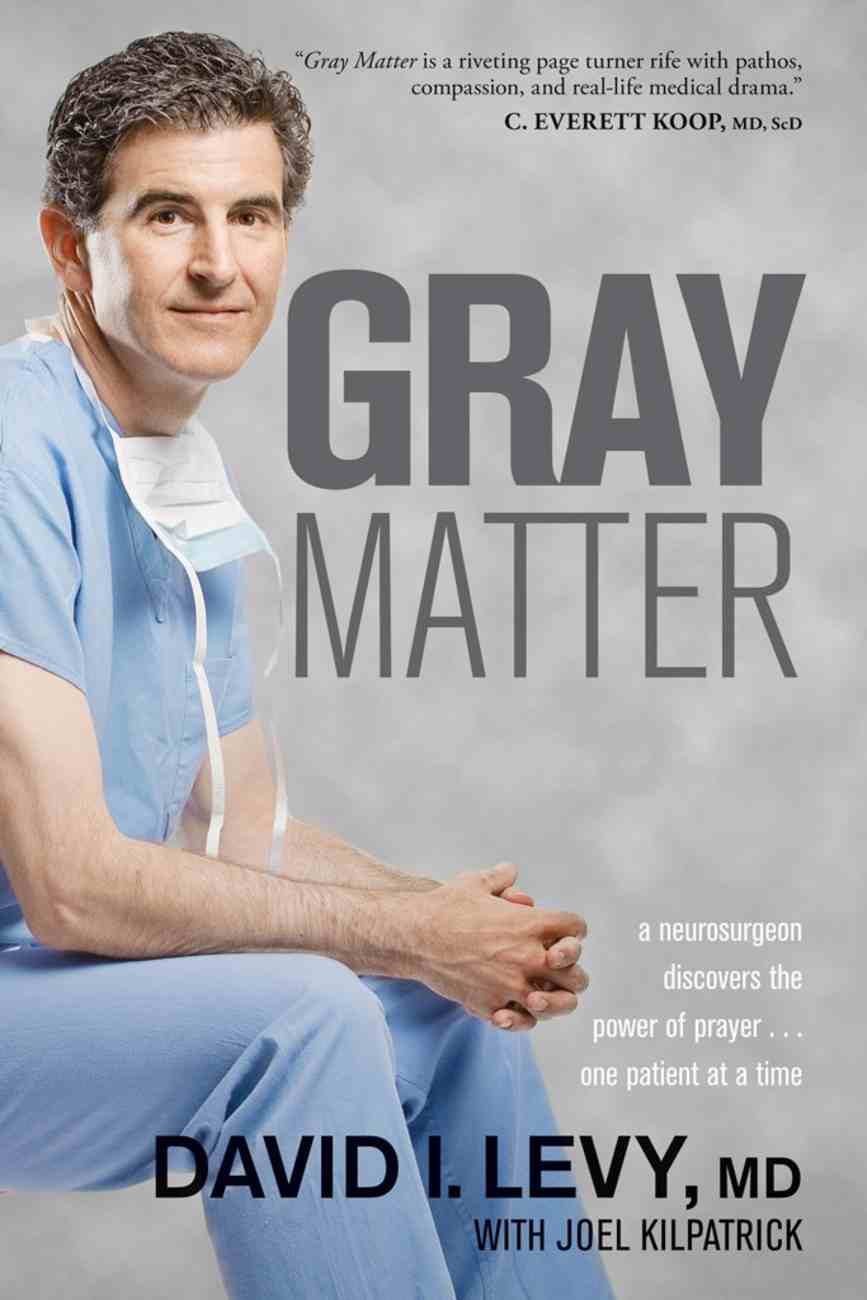Gray Matter by Dr. David Levy is a multi-faceted book. Two days after I was asked to do this review, Pastor Doug Pratt delivered a sermon on “Missing the Most Important Thing” based on Matthew chapter 19. I imagine the sermon was composed and fresh in Dr. Pratt’s mind when the request for a review of Dr. Levy’s book came to him for this issue of the Epistle dealing with holistic faith. Let me try to put this together so that it makes sense.
Dr. Levy is a neurosurgeon—not just any neurosurgeon but one of the best of the best, la crème de la crème. Yet, in high school, he didn’t even plan to attend college, not until he had an epiphany while working underneath his car. He thought if he was good at fixing cars, he could also be good at fixing people. Two years later he entered Emory Medical School in Atlanta, GA. Upon finishing, he was chosen for the rigorous seven-year residency in neurological surgery at the Barrow Neurological Institute in Phoenix, AZ. David also completed a fellowship in endovascular neurosurgery in Vienna, Austria. He stood at the pinnacle of the most challenging aspect of what is arguably the most difficult surgical field.
After completing his education and training, David accepted a position at a large, university-affiliated teaching hospital which was also a Level I trauma center in Pittsburgh. From personal experience I can attest to his statement that it was a busy practice with plenty of opportunities to operate and hone his skills. David was also pursuing his academic career through writing, lectures, and travel. His social life was likewise full, even dating a fashion model. As he put it, he “should have been the happiest guy in the world” …but he wasn’t. Something seemed lacking. David had to blame someone, so he blamed his father. He spoke to his mother about this and she told him he was wrong and that he should forgive his father—he did—and that made a big difference. He received a job offer at a community hospital in San Diego—a complete change of pace, scenery, climate, and stress—and he took it.
Throughout this period, David had associated with the Jewish medical community. His father had been a Sephardic Jew who escaped Europe and the Nazis in the WWII era. Upon arriving in the United States, his father had accepted Jesus as his Savior and become a Messianic Jew. David preferred the intellectualism of the Jewish community and practiced the Jewish faith. Now, with more time on his hands, he began reading the books of the Bible, first the Old and then the New Testaments. He became increasingly impressed with Jesus and ultimately became a devoted follower of Christ.
David’s book is subtitled, “A Neurosurgeon Discovers the Power of Prayer… One Patient at a Time.” In chapter 1, we learn a few things about the brain and neurosurgery, and how he “as a practicing neurosurgeon began to address the spiritual and emotional aspects of health and pray with the people he operated on.” David admits he was not graceful or confident at first; it wasn’t the kind of stuff he’d been taught in medical school, but in time it became part of his normal routine and people came to expect it.
What follows are a series of vignettes of his prayers with his patients—some thrilling, some scary, some poignant—all remarkable learning experiences for David. As the story progresses, he delves more deeply into the patient’s personal problems with a focus on blame, envy, and bitterness. He states:
The idea that bitterness was the source of health problems would not have made sense to me early in my career, but over time I became convinced that one of the greatest thieves of joy and health is the unwillingness to forgive the people who have hurt you.
Now, to tie this together with Matthew 19 and Dr. Pratt’s sermon, the Scripture passage referred to a successful young man who approached Jesus asking what good he could do to achieve salvation. Jesus, after going through the commandments, told him to cast off his worldly belongings and follow Him. The young man, having many possessions, turned his back on Jesus and walked away. Dr. David Levy did not walk away. Toward the end of the book, David spends more time dealing with spiritual and psychological issues with his patients and less time on surgery. This book was written 10 years ago; today Dr. Levy no longer practices neurosurgery. He lives a relatively humble life with his wife in San Diego and gives inspirational lectures and seminars. Dr. Levy cast off his worldly possessions, his “king of the hill” neurosurgical status, and is following his Savior, Jesus.
In closing, Dr. Levy says, “Let us remember we are all on a journey, that none of us have yet arrived.” Another book will be forthcoming.
BOOK REVIEW by Dr. John Phillips
EDITOR’S NOTE: Dr. David Levy practiced high-risk endovascular neurosurgery for over 20 years and has spoken internationally on neuroscience and faith. After serving as Clinical Professor of Neurosurgery at the University of California, San Diego, in 2017 he transitioned out of medicine to pursue teaching and creating resources for better brain and mind health.





